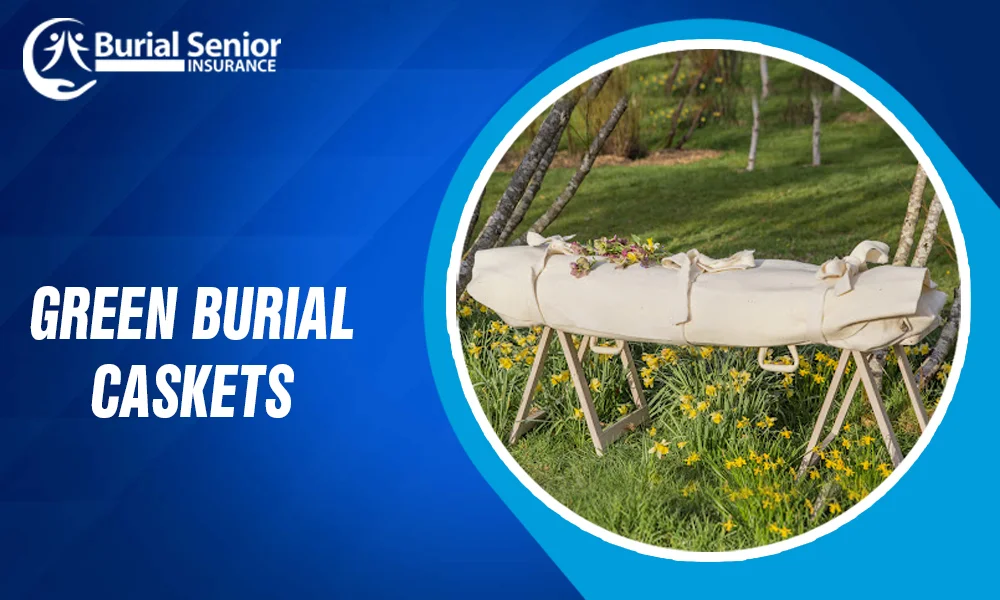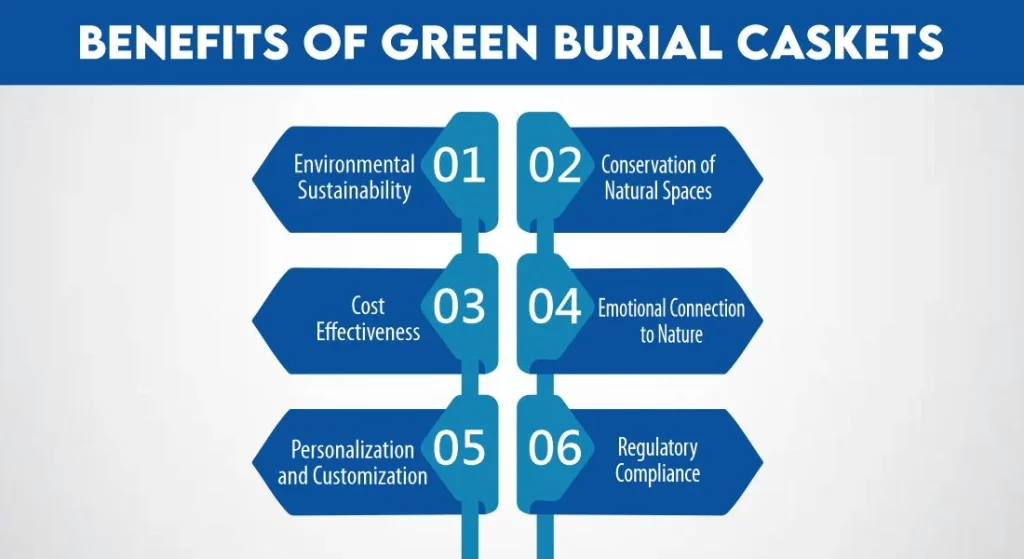Last Updated on: March 28, 2025
Reviewed by Kyle Wilson

The idea of “green burials” has come into light as an environmentally friendly replacement for customary funeral customs as we think about how our decisions affect the environment. The concept of using eco-friendly choices, such as biodegradable caskets, to reduce our environmental impact even in our ultimate resting place is at the core of this movement.
However, who makes green burial caskets precisely, and how can they help to ensure a more environmentally friendly death? Together, let’s investigate the meaning and advantages of choosing funeral caskets as a way to honor our departed loved ones and the environment
Customized Options Await
Green burial sometimes referred to as environmental burial, is a more environmentally friendly method of interment than traditional burial techniques. The body gets buried without the use of concrete vaults, metal caskets, or embalming fluids in a green burial. Actually, the dead are placed in a biodegradable cover, a coffin, or a container constructed of cardboard as a base wicker, or reeds.
Usually, the burial place is an undeveloped, natural location like a meadow, woods, or designated green cemetery where the interment blends into the surrounding ecology. By letting the body gradually decay and return to the earth, Green Burial Caskets seek to reduce the price and negative effects of the burial process on the environment while enhancing the soil and promoting the growth of local plant and animal life.
Green funerals, which use chemical embalming and non-biodegradable materials, encourage sustainability, conservation, and a closer relationship with nature.
In the US, green burial is permissible, yes. Green burial techniques are not prohibited by federal legislation, and many states permit natural burials in cemeteries that are designated as green spaces or by current cemetery rules. State and local laws and criteria about green burial, however, may differ.
The viability of green burial solutions in some locations may be impacted by state-specific rules or regulations governing burial customs, cemetery management, and the treatment of human remains. To protect public health and safety, green burial techniques also need to comply with health rules and
environmental regulations.
The growing demand for environmentally friendly burial choices has led to the opening of several natural funeral chapels and green cemeteries within the United States. These cemeteries frequently adhere to green standards, such as banning embalming fluids, requiring biodegradable shrouds or caskets, and encouraging the preservation of open spaces.
While it is allowed to have a green burial in the United States, those who are interested in doing so should find out what the rules are in their region, speak with funeral directors or cemetery operators who are familiar with green burial methods, and make sure that all relevant regulations and laws are adhered to.
Sustainable burial caskets, often referred to as environmentally friendly or disposable caskets, consist of materials which break down organically over time with minimum harm to the environment. Instead utilizing metal, dangerous chemicals, or toxic substances that are typically used in standard caskets, these caskets are made from biodegradable materials like bamboo, wicker, seagrass, cardboard, or responsibly obtained wood.
The objective of burial caskets is to allow a more environmentally friendly burial process by letting the dead body naturally return to the the earth, without producing harmful substances or affecting the state of the natural world. The goals of natural or green funerals are backed by burial caskets, which place a value on ecological preservation, minimalism, and the seamless integration of human remains with the natural world.
Environmentally friendly and recyclable substances are used in the manufacturing of natural and green caskets. Below are some elements that are often used to make these caskets:
Bamboo: For a lightweight yet durable casket material, bamboo is a rapidly growing and renewable resource. It is an excellent choice for Green Burial Caskets because it is environmentally friendly and recyclable.
Willow/Wicker: Weaved from natural fibers, willow or wicker caskets have a natural style. These materials are frequently utilized in green burial customs because they break down quickly.
Seagrass: Created from seagrass sections, seagrass caskets offer a recyclable and environmentally responsible option for burying. Seagrass is a natural option since it grows and is plentiful in coastal places.
Pine: As it is easily available, affordable, and recyclable, pine is commonly used for making natural caskets. Pine coffins can be painted or left unpainted to enhance their appearance.
Cardboard: Completely recyclable, thin, and affordable, cardboard coffins are. It may be customized with designs or phrases and is usually used as a greener alternative to traditional caskets.
Willow Coffins: Crafted entirely of recyclable willow branches, these coffins are weaved. They are environmentally sustainable and have a unique, natural look.
Banana Leaf: Environmentally safe and recyclable, banana leaf funeral caskets are made. Many recyclable leaves of the banana plant are used to weave them.
Such substances are ideal for natural and green burials because of their ability to decompose, sustainability, and low ecological impact.

Green burial caskets offer several benefits, both for the environment and for those planning end-of-life arrangements:
The fact that burial caskets have a minimum impact on the environment may be their most important advantage. These coffins are made of recyclable substances that break down organically over time, such as cardboard, bamboo, willow, and seagrass. The burial caskets contribute to pollution reduction and the preservation of natural resources by minimizing the use of metal, dangerous substances, and materials that are not recyclable.
Green burials commonly take place in fields, forests, or designated green cemeteries where burial sites mesh in with the surrounding environment. People may help preserve natural areas, keep the land undeveloped, and promote ecological by choosing an environmentally friendly funeral casket.
In contrast with traditional caskets built of metal or hardwood, burial caskets are usually more affordable. These caskets are an affordable choice for people who are on limited funds as they are frequently made of easily accessible materials and have simpler patterns.
As the dead’s body returns to the ground naturally, burial caskets create an emotional bond with nature and the life cycle. Knowing that their last resting place is surrounded by the beauty of nature and is following its surroundings gives many individuals comfort.
A variety of styles and materials are accessible for burial caskets, enabling people to select a container that best symbolizes their personal preferences and values. There are solutions to fit every taste and style, whether you’re looking for an easy cardboard coffin with a detailed design or an ordinary wicker casket.
Burial caskets satisfy the criteria of environmentally conscious burial practices, which frequently call for little alteration and adherence to strict guidelines. By selecting a green funeral casket, people can respect their commitment to sustainability while making sure that the law is observed.
Overall, green burial caskets provide a meaningful and environmentally conscious choice for end-of-life arrangements, allowing individuals to leave a positive legacy while protecting the earth’s natural resources.
Yes, green burial caskets are considered beneficial for the environment. These caskets are constructed from recyclable components such as bamboo, willow, seagrass, cardboard, and other sustainable materials. Like typical caskets built with metal, hardwood, or synthetic materials, burial caskets rot naturally over time, returning to the ground without leaving extremely dangerous residues or contributing to environmental decline.
In addition, burial caskets are frequently employed in combination with green burial methods, which emphasize minimal impact on the environment, natural space safety, and the gradual integration of human remains into habitats. Individuals can minimize their carbon footprint by using a green funeral casket, supporting sustainable tasks, and leaving a positive environmental legacy.
In general, green burial caskets offers an eco-friendly alternative to traditional burial customs, honouring the departed respectfully and sustainably while safeguarding the environment for future generations.
The price of a green burial casket differs depending on the material picked out, the expertise involved, and the supplier or manufacturer. Green burial caskets are often cheaper than typical caskets constructed of metal or hardwood, however pricing can vary greatly.
Simple and basic funeral caskets built of materials like cardboard or woven seagrass may vary in price from just a few hundred to a few thousand dollars. These choices are frequently less expensive and provide a more simple approach to environmentally conscious burial.
On the high end, advanced funeral caskets built of quality materials like bamboo, willow, or sustainably sourced wood can cost several thousand dollars or more. These caskets may include beautiful patterns, greater quality control, and materials of greater quality, which contribute to their greater price.
When selecting a green burial casket, it is critical to conduct research on various providers, compare pricing, and consider your budget and preferences. Furthermore, certain funeral homes or green cemeteries may provide packages or discounts on green burial services, which may cover the cost of the casket in addition to other burial-related expenses.
Finally, green burial caskets are a dedicated and sustainable solution for people who want to leave a reduced imprint on the planet after death. By utilizing sustainable and recyclable materials, these caskets ensure that the ultimate act of resting in peace is also an act of goodwill to the environment.
As society becomes more aware of the negative environmental effects of traditional burial practices, the selection of funeral caskets provides an opportunity to honor those who passed away while preserving the ideals of sustainability and environmental sustainability. This approach allows for a physical return to nature while also supporting the preservation and reconstruction of natural areas.
In the broader context of green burials, these caskets are a key element in a movement that seeks to reconcile human mortality with the ongoing health and vitality of the earth, making a powerful statement about the legacy one chooses to leave behind.
Senior Writer & Licensed Life Insurance Agent
Iqra is a dynamic and insightful senior writer with a passion for life insurance and financial planning. With over 8 years of hands-on experience in the insurance industry, Iqra has earned a reputation for delivering clear, actionable advice that empowers individuals to make informed decisions about their financial future. At Burial Senior Insurance, she not only excels as a licensed insurance agent but also as a trusted guide who has successfully advised over +1500 clients, helping them navigate the often complex world of life insurance and annuities. Her articles have been featured in top-tier financial publications, making her a respected voice in the industry.

Burial Senior Insurance provides information and services related to burial insurance for senior citizens, including policy options and end-of-life support services.
Copyright © Burial Senior Insurance 2025. All Right Reserved.

Get Free Life Insurance Quotes